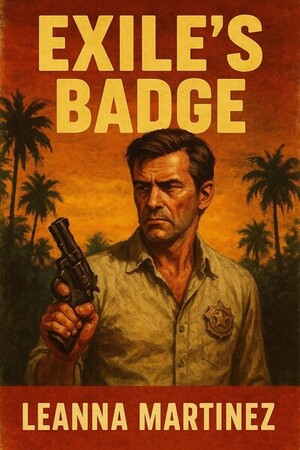Chapter 10:
Ghost of a Badge
Exile's Badge
The days bled into each other, each one indistinguishable from the last. Sam no longer kept a calendar, no longer marked time in anything but the changing shape of motel ceilings. He’d wake in a different room every few weeks, the smell of mildew and old cigarettes clinging to the curtains, a duffel bag always packed and ready by the door. He never unpacked. Unpacking meant staying, and Sam had forgotten how to do that.
Work came in scraps. A warehouse security shift here, a bar bouncer’s paycheck there. Sometimes a divorce lawyer needed photos of a cheating husband, or a worried parent wanted someone to find their runaway kid. Sam took those jobs too. He was good at watching, at waiting, at finding what didn’t want to be found. But none of it mattered. It wasn’t work so much as movement, a way to keep his hands busy and the rent covered.
He spent his mornings in diners, the kind where the coffee was burnt and the eggs always overcooked. At first the waitresses asked for his name, tried to make small talk, but eventually they stopped. He became just another man sliding into a booth, another faceless order of coffee and toast. He didn’t mind. The less he had to explain, the easier it was to get through the day.
Nights were worse. Nights stretched long and merciless, the silence pressing against the walls of whatever room he happened to rent. He’d sit on the edge of the bed with a bottle, staring at the revolver he kept on the nightstand. He never picked it up, not really. But he never put it away either. Some nights he’d pour until the bottle was light, just to drown out the memory of Maggie’s voice or the way Emily’s drawings used to cover their refrigerator.
Without the badge, Sam felt like he had no weight, no outline. For years it had been his shape, his excuse for all the long hours and late nights, the justification he gave Maggie when she asked why he couldn’t just let it go. The badge had been his armor, and the city had taken it from him without ceremony. Now he was just a man with skills nobody wanted, except the kind of people who paid cash and asked no questions.
He found himself thinking often of Maggie and Emily, but differently than before. When he’d still worn the badge, their absence had been something he shoved down, buried under files and stakeouts and empty coffee cups. Now it had room to breathe, and it filled every corner. He’d see a girl at a bus stop holding her father’s hand and think of Emily. He’d pass a woman folding laundry on a fire escape and think of Maggie. And each time it hit him like a punch he couldn’t brace for.
The city didn’t need him anymore. It never had, not really. Men like Caruso thrived because the city let them, because the city wanted them. Sam had believed he could fight that, believed the truth was something worth bleeding for. Now all that was left of that belief was the weight in his chest and the emptiness in his hands.
He carried himself through the days with the kind of numb discipline that came from years of habit. He still scanned faces in crowds, still checked his mirrors when he drove, still sat with his back to the wall in every diner. The instincts didn’t fade just because the badge was gone. But they felt useless now, reflexes without a cause, like a soldier patrolling a battlefield long after the war was lost.
One night, after a shift guarding a warehouse no one would ever break into, Sam stood outside under the sodium glow of a streetlight. The pay was in cash, folded neatly in an envelope. He thumbed through it without interest and shoved it into his coat pocket. Around him the docks were silent, the water black and still. He lit a cigarette and drew the smoke deep into his lungs, holding it there as if it could fill the hollow places inside.
The badge had given him shape. Without it, he was just smoke on the wind, waiting to scatter.
* * *
The ballroom smelled of money disguised as perfume. Crystal chandeliers threw soft light across polished floors, catching the sequins on evening gowns and the shine of tailored shoes. Waiters in white jackets moved like ghosts with silver trays, offering champagne flutes to men who’d made their fortunes on the city’s secrets and women who wore their influence like a second skin.
Sam stood near the entrance in a rented blazer, an earpiece coiled into his collar. The company that had hired him billed itself as “private security solutions,” but it was just muscle with paperwork. Tonight his job was simple: keep uninvited guests out and make sure the important ones felt safe enough to toast themselves.
He scanned the crowd with the same eyes he’d once used on street corners and stakeouts. Only now the crimes wore cufflinks. Politicians slapped each other’s backs, contractors laughed too loud at jokes that weren’t funny, and a priest raised a glass to a councilman as though blessing the communion wine. The city wasn’t hiding its rot anymore. It had polished it, set it under lights, and called it charity.
And then he saw him.
Caruso.
The man looked larger than life, his suit cut sharp, his tie perfectly knotted. He was laughing at something whispered by Councilman Vickers, one hand resting lightly on the man’s shoulder as if he owned not just the moment but the man himself. Around them clustered half the room: businessmen, priests, faces Sam had once scribbled into his notebook as “persons of interest.” Now they were Caruso’s audience. His court.
Sam’s jaw tightened, but he didn’t move. He stayed in his corner, a piece of furniture with a job. He told himself Caruso wouldn’t notice him, that a man like that had no reason to look twice at hired security.
He was wrong.
Caruso’s gaze swept the room once, casually, and locked on Sam like it had been looking for him all along. A smile touched his lips, small, precise, and utterly confident. Then, without breaking stride, Caruso excused himself from the circle of power and walked straight toward him.
Sam felt his pulse slow, the way it always had before a confrontation. Not faster, slower. Like his body was saving every beat for what might come.
“Detective Holden,” Caruso said warmly as he reached him, voice smooth enough to cut glass. “It’s been too long.”
Sam kept his hands folded in front of him, professional, neutral. “I’m not a detective anymore.”
Caruso’s smile widened, sympathetic on the surface, sharp beneath. “So I’ve heard. Still, you’ll always be Detective Holden to me. A man who never let go of a bone once he bit down.”
The words were a compliment dressed as a mockery. Sam didn’t answer.
Caruso glanced around, lowering his voice as if sharing something private between old acquaintances. “I’m glad to see you’ve landed on your feet. Honest work. Important work. Protecting people.” His eyes flicked to the champagne trays and velvet drapes. “And what better people to protect than the ones who keep this city alive?”
Sam’s face didn’t change. “Just a job.”
Caruso chuckled softly, as though enjoying an inside joke. “Of course. Just a job.” He leaned in a fraction closer, enough that only Sam could hear. “It suits you. You look well. Stronger, maybe. Sometimes losing everything clears the slate.”
Sam’s hand twitched at his side, but his voice stayed steady. “Sometimes it just leaves you with nothing.”
For the first time, Caruso’s smile flickered, not gone, just thinner, a shadow passing over the surface. Then it returned, polished again. “You always did have a way with words. Shame the city never appreciated that. Still, I hope you’ve found some peace.”
Sam met his eyes. “Peace is overrated.”
Caruso laughed again, loud enough for those nearby to hear, and clapped him lightly on the shoulder, the way one man might with an old friend. “Well, Detective, I wish you the best.” He straightened his tie, adjusted his cuff, and turned back toward the circle waiting for him. Within seconds, he was laughing with Vickers again, the picture of charm and legitimacy.
Sam stood alone at the edge of the ballroom, the champagne bubbles fizzing faintly in the background like static in his ears. He could still feel the ghost of Caruso’s hand on his shoulder, heavier than the revolver he’d left back in the motel drawer.
The man had everything now, respect, power, and legitimacy. And Sam? Sam was a rent-a-guard in a borrowed blazer.
The humiliation didn’t burn hot. It settled cold, deep in his gut. Not anger. Not even hate. Just the steady, unshakable weight of loss.
He touched the earpiece in his collar, muttered a routine check into the mic, and went back to scanning the room. But inside, he knew Caruso had won that night, just as surely as he’d won every night since Maggie and Emily were gone.
* * *
The motel room smelled of mildew and bleach, a stale combination that no amount of open windows could cure. The carpet was thin, worn to the threads in places, its stains permanent witnesses to other lives that had passed through. A single bare bulb hung from the ceiling, casting a yellow circle over the small wooden table by the window.
Sam dropped his duffel on the bed. He never unpacked. He just shuffled the same shirts and trousers from one cheap room to the next. He sat heavily on the mattress, the springs creaking beneath his weight, and pulled the revolver from his coat. He set it down on the table beside the flask, the two objects catching the light like relics from another life.
For a long time, he just stared at them.
The revolver was clean, well-oiled, its steel still gleaming despite everything. A tool of order once, something that had given him authority, control. Now it was just a weight, a reminder of what he had lost. The flask beside it was dented, scratched, the leather wrap worn soft from his hand. Both promised escape, though in different ways.
Sam poured a swallow from the flask into the glass on the table. The liquid shone amber in the bulb’s glow. He drank it down and set the empty glass next to the gun.
His mind betrayed him then, sliding back to the ballroom, Caruso’s hand clapping his shoulder, the smile carved onto his face like a scar. You look well, Detective. Glad to see you’ve landed on your feet. Sam could still hear the words, smooth as velvet, meant to humiliate without leaving a bruise.
He pictured raising the revolver in that ballroom, firing once, watching the shock ripple through the gathered politicians and priests. He imagined Caruso’s body dropping, the smile erased forever. The fantasy was vivid, intoxicating. For one glorious second, the ledger would feel balanced.
Then Maggie’s face cut through the haze. Emily’s laughter, high and bright, filled his ears. He remembered the rabbit lying on the highway asphalt, the crayon drawings still taped to the refrigerator door.
Pulling the trigger wouldn’t bring them back. It wouldn’t undo the silence in the house, the emptiness that had swallowed him whole. It would only turn him into what he hated most, another man who solved problems with blood. Another Caruso, just in a different suit.
He pressed his palms to his eyes, the revolver still glinting in his peripheral vision. The urge was strong. The anger was sharper than the whiskey. But beneath it ran something deeper, quieter, a refusal. If he crossed that line, then Maggie and Emily would be gone for nothing.
His hand reached out, slow, deliberate. He brushed the revolver’s grip with his fingers, feeling the cool steel, the way it steadied against his palm. He held it there, finger brushing the trigger, breathing in the weight of the choice.
And then he lowered it.
The gun went back into the drawer of the motel nightstand with a dull thud, the wood swallowing its shine. Sam closed the drawer firmly, sealing it away. His hand lingered on the knob a moment longer, as though testing his resolve, then let go.
He unscrewed the flask again, poured another swallow, and drank. The burn traveled down his throat, filling the hollow places inside with fire for a moment before fading into ash. He leaned back against the headboard, the glass still in his hand, the room pressing down on him.
The ceiling above was cracked, water stains blooming across the plaster like maps to nowhere. Shadows shifted as cars passed outside, headlights cutting through the thin curtains before vanishing again. He followed each flicker until his eyes blurred, the rhythm almost comforting in its emptiness.
He was alive. Not living, not in any way that mattered. But breathing. He was a ghost with no badge, no family, no anchor. A man drifting through the wreckage of a life that used to have meaning.
Sam closed his eyes and let the silence settle. For tonight, survival was enough.




Please sign in to leave a comment.